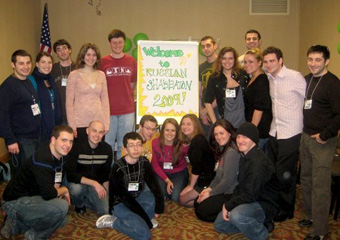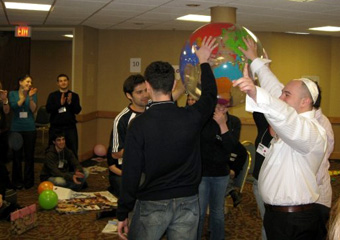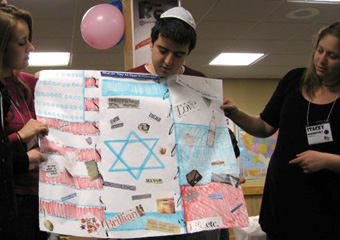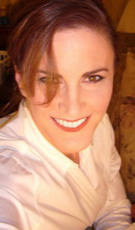Juggling Identities
Permanent link

Ninety-six participants in the sixth annual Russian Shabbaton divided into small groups to discuss issues of identity, history and immigration. Jane Charney (second from left in the back) led one of the groups with husband Max Averbukh (first from left in the back).
What makes us Jews? Whether it’s blood, belief or cultural bonds, it can be hard to define exactly what makes us “Members of the Tribe.”
The identity question is especially challenging to one subset of the American Jewish Tribe: the Russian-speaking Jews. Officially, more than 30,000 Jews from the former Soviet Union have resettled in Chicago in the past 15 years alone. Many more probably immigrated under the radar. In total, almost one million Russian-speaking Jews live throughout North America.
One of those one million, I was 13 when my family moved from Moscow to Cincinnati, Ohio, to join the families of my aunt and uncle in 1996. Although we were among the last in the extended family to emigrate from Russia, my family had been trying to leave since the mid-1980s. And though my siblings and I never faced outward discrimination for being Jewish, my parents would tell stories of being rejected from university or forced to take a lower-level position because of the word “Jewish” written in their passports.
For Russian-speaking Jews, questions of identity – and there are many – often begin in ethnic terms. In the Soviet nationalities policy, the term “Jewish” meant descended from other Jews – an ethnic designation. In fact, Soviet passports answered the “ethnic origin” question with “Jewish,” much as an ethnic Tajik’s passport would say “Tajik.” This Soviet-era policy fostered an abhorrence of labels of all kinds and the reticence to join any official community.
Despite having been inculcated with the idea of Jewishness as ethnicity, Russian Jews often repressed the notion upon arrival to the United States to try to fit in. Here, Judaism is a religion and a culture, albeit one that might not be familiar to families used to standardized Soviet traditions.
Religious practice and knowledge is an issue in itself: Many Russian-speaking Jews either have no exposure to synagogue life beyond their first couple of years in the States or believe that the Orthodox practice is the only option. Good luck finding a Conservative or Reform synagogue-affiliated Russian-speaking Jew. The story goes something like this: A rabbi asks a Russian Jewish woman what one would eat on Yom Kippur. “Matzah?” she wonders. Although this group might have an idea of some Jewish holidays, the familiarity is only skin-deep for many.
Culturally, we might know more about how to make Olivier (a Russian potato salad) than gefilte fish, and have assimilated Russian intellectual pursuits into our psyche. Whether it’s been five or 15 years since immigrating to the States, many of us still cherish some aspect of our Russianness – the language or the culture or the sheer wealth of jokes that simply do not translate well into English. At the same time, we live here, we speak English with our friends, and our attitudes borrow from both our American education and our Russian-Jewish souls.
The question of who we are loomed large at this weekend’s sixth annual Midwest Russian Shabbaton – a program of Russian Hillel, which is part of Hillels Around Chicago. Unlike other Hillel programs, the participants at the Shabbaton ranged in age from 18 to 32. Although Hillel’s programs are geared primarily to college students, Russian Hillel has been attracting older crowds as well since its founding six years ago. Perhaps, this is because Russian-speaking Jews want to figure out this mindboggling hodgepodge of identities swirling in their heads.

Participants perform a skit representing their connections at the sixth annual Russian Shabbaton
Throughout the weekend, both participants and staff tried to speak mostly in Russian, but English words crawled into the sentences here and there. And for the first time in the Shabbaton’s history, some participants could not communicate in Russian at all, forcing staff to translate throughout sessions. Still, even those who do not speak the language maintain a connection to some inherent Russianness and consider themselves a Russian-American Jew rather than just an American Jew.
In college, my best friend introduced me to Hillel, and we established a weekly ritual of celebrating Shabbat there. Although I think of those days fondly, I also remember feeling that something was missing. I found out about the first Russian Shabbaton in 2004 through a friend of a friend, and the missing piece was revealed. It was the chance to speak about being Jewish in the context of also being Russian, and not having to choose between the two. Even more importantly, it was the chance to speak about these issues in Russian. Although both Cincinnati and Indiana University had large Jewish communities, I did not connect with many Russian speakers outside of my family. I went to the second Shabbaton as a participant and was invited to become staff for the following year and have enjoyed that role ever since.
The Shabbaton opened my eyes to the fact that the idea of being unique appeals to us, and finding a niche to fit in seems easier among people who share the experience of immigration – whether it’s in our immediate past or in our parents’ stories.
For me, being Russian was never a cause for embarrassment. I picked up English quickly, and my name is sufficiently American, having been changed from Yevgeniya Charnaya to Jane Charney upon arrival to Cincinnati, Ohio in 1996. Still, I sign most communication with Russian friends with Zhenya, the diminutive of my official Russian name. Many participants shared memories of getting weird looks or comments from fellow students or teachers who could not twist their tongues around the unfamiliar Slavic sounds. Language issues persist in our community: A Russian accent can be heard a mile away. And Russian food – all things pickled or loaded with mayo as well as the abundance of beets and unhealthy fried things – seemed bizarre to American classmates and friends. Yet, slowly, they came to cherishing their uniqueness. They might have tried to reject all memories of immigration and being Russian as high-schoolers, but, like me, inevitably discovered that something was missing from their lives.
To help others flesh out being a Russian-speaking Jew living in the United States, I created a Shabbaton activity around the 2004 documentary “The Tribe,” which condenses thousands of years of Jewish history into 16 minutes. After watching the film, we used crayons, markers, construction paper, poster-board and magazines to creatively illustrate the shared aspects our identities, releasing our inner kindergartners in the process. The 11 finished products all featured an Israeli flag marking this group’s strong connection to Israel. Yet all the other elements varied – groups used everything from the star and sickle and the Old Glory to pictures of diamonds and books as representations of professions to images of vodka and Shabbat candles to illustrate aspects of their identity.

Participants released their inner kindergartners and creatively illustrated the shared elements of their identity, including the Star of David, and the American and Russian flags
Participants also addressed the question of identity head-on in a series of workshops led by David Shneer, a University of Colorado-Boulder professor of history and Jewish studies, who engaged the mind and focused on migration stories and the feeling of “gerness” (ger is Hebrew for stranger). Shneer not only used texts by Russian-American writers, but also the parasha (Torah portion) of the week, Mishpatim, which details all the things forbidden to the Israelites, including mistreating the “ger.” The feeling of gerness is common to all immigrants and especially to Russian-speaking Jews as they seek a place to fit in. Hopefully, the Shabbaton is one such place.




.jpg)



